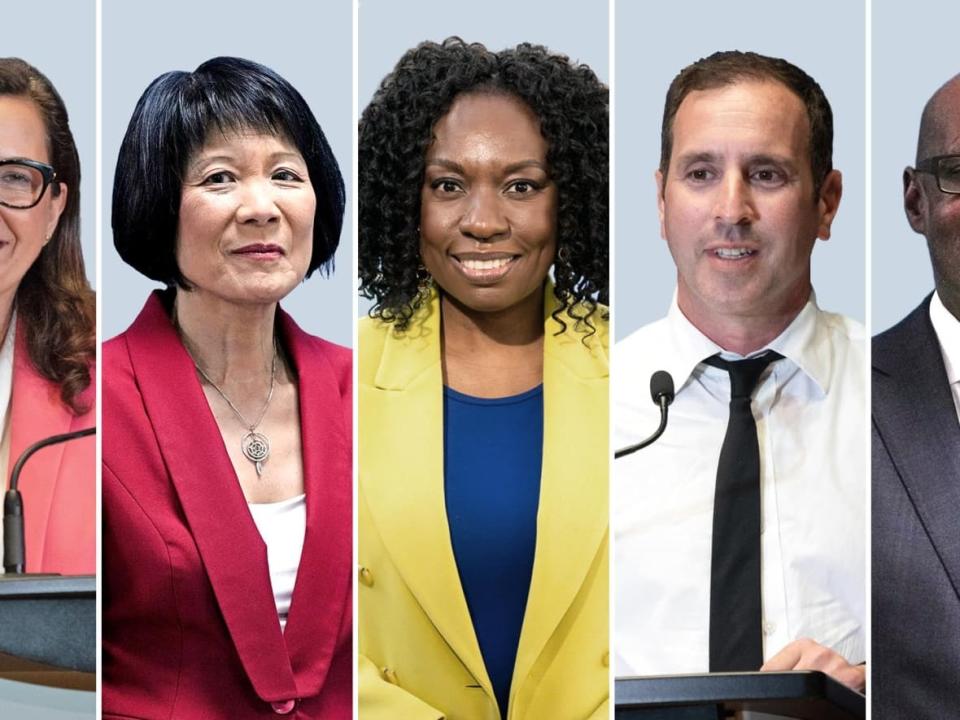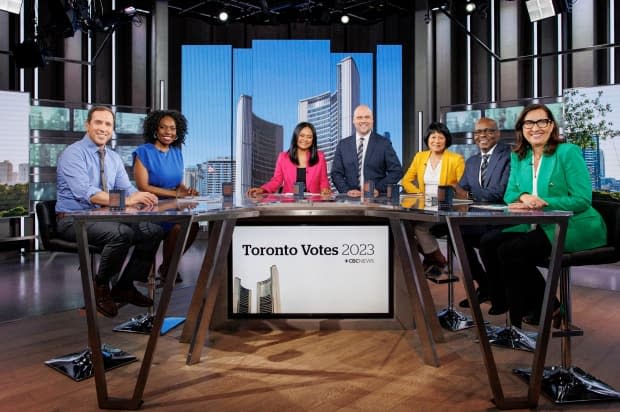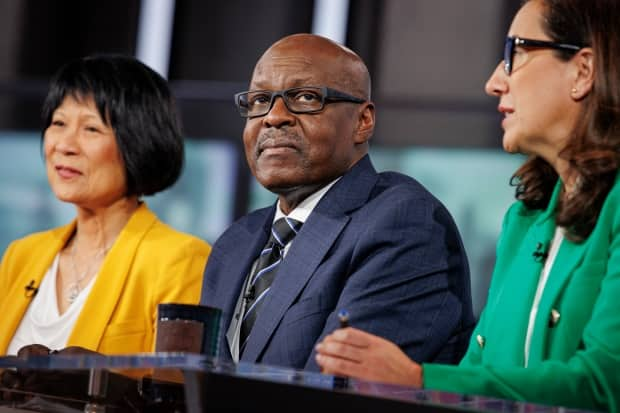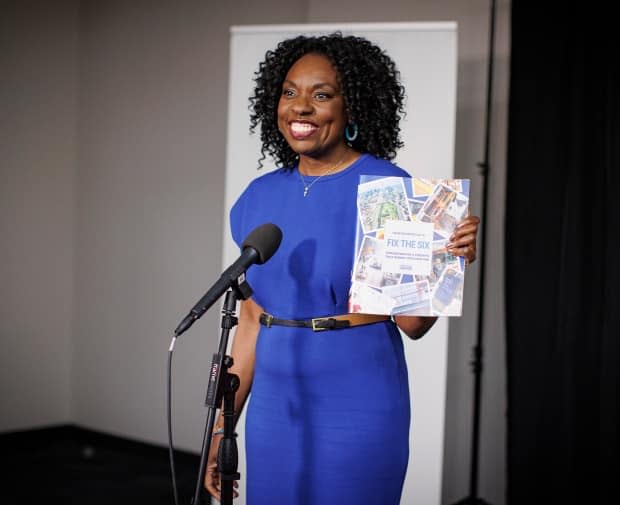
The 90-minute debate saw lively exchanges as Ana Bailão, Olivia Chow, Mitzie Hunter, Josh Matlow and Mark Saunders pitched their competing visions for Toronto with just under three weeks until election day. The contest saw crossfire between candidates who had previously aimed many of their attacks in earlier debates at frontrunner Chow.
That said, Chow was repeatedly pressed by rivals to explain why she hasn’t said by how much she would raise property taxes to pay for her promises. She has only said a “moderate” increase would be necessary but has thus far declined to be specific.
Answering a question from CBC Toronto’s Shawn Jeffords — who hosted part of the debate alongside moderator Marivel Taruc — Chow said it doesn’t make sense to tie property tax increases to the rate of inflation.
“What we need to do is be people-centred. Start with people. Let’s look at all the services that are needed, build the budget, calculate how much it’ll cost and then look at alternate ways of financing it,” she said.
“Then you go and ask the federal and provincial government for support and for partnership, right? And then look at the inflation rate and then look at the property tax,” she continued.

The same poll had Matlow at 12 per cent, Bailão at eight per cent and Hunter at seven per cent.
For his part, Saunders directed many of his attacks at Chow, particularly questioning her relationship with the Toronto Police Service.
“How are you going to be able to work with the police service that you do not like?” he asked, implying that public safety is not a priority for her.
Saunders defends record
In a heated exchange that followed, Chow pointed out that the police budget increased 12 per cent during Saunders’ nearly five-year tenure as chief while 911 call wait times grew longer. Saunders defended his record managing the billion-dollar balance sheet, saying he was forced to “allocate the funds as best as possible, utilizing tax dollars as best as possible, to have the most successful outcomes.”
Saunders says his experience as police chief means he could get the city’s finances in order as mayor. His plan to address the $1.5-billion budget hole would rely largely on spending cuts and reallocating resources to fewer priorities.
When repeatedly asked for specifics about what he’d cut, Saunders did not answer, saying he would need to open the books before making any decisions. He also said that the city’s publicly available budget documents are not clear enough for him to make a plan in advance.
“It’s important to do that work, to look at the budget and to break it down and to find out exactly how money should be spent. And then of course the leadership of executing [the budget],” Saunders said.
The city’s role in building housing
On the housing file, candidates were asked to answer yes or no on whether the city should act as a builder to get more affordable units built. Matlow, Hunter and Chow have proposed plans that would see the city heavily involved in the development process.
They each cite the lack of private-sector equity offered up for the existing Housing Now program, which has not built a single new unit since it was introduced four years ago.
Bailao stressed that the city, other levels of government, private sector and non-profits need to work collaboratively to get housing built but that “adding more bureaucracy” shouldn’t be part of the solution.
Meanwhile, Saunders was the lone “no,” saying “builders build” and as mayor he would speed up the process of construction through permitting reform and new measures to hold developers accountable.
Hunter referenced rising levels of homelessness and a lack of city-backed affordable housing units when she claimed that a mayoralty under Bailão, who was former mayor John Tory’s housing point-person, would lead to “more of the same.
“I just don’t think that’s what [Torontonians] need right now,” Hunter said. “They need real change and a real plan.”
In response, Bailão claimed Hunter, the former chief administrative officer for Toronto Community Housing, left the city-subsidized affordable housing provider in crisis.
“I don’t have to learn on the job. I know how city hall works. I have the support of colleagues. I know how to get the job done,” she said.
Several candidates also used the discussion on housing to take aim at Matlow. During his 13 years as a councillor, Matlow has voted at times against measures for increased density in his ward of St. Paul’s, with some critics accusing him of NIMBY-ism.

“What we need is forward planning so that we don’t just plan building by building or have our planners react, but we actually look at the whole area, the whole neighborhood and make sure that we have services and infrastructure to support housing. And ultimately, it can’t just be a supply of condos. It’s got to be affordable housing.”
Day 1 priorities
During one segment, the candidates were asked what their first priority would be on day one as mayor. Their responses were:
- Hunter: Declaring there is no surplus city land. Rather, all available city land will be used for affordable housing developments.
- Chow: Fix potholes across the city.
- Saunders: Begin implementing his plan to improve safety on the TTC.
- Bailão: Securing a new deal for additional funding from the province and federal government.
- Matlow: Fix the budget by implementing new revenue streams and cutting “waste wherever it exists.”
The debate came just two days before advance voting begins, with election day on June 26. You can learn more about how to vote here.

Chow’s favourite music venue was The Phoenix, Matlow’s favourite patio was the Black Bull, Saunders’s favourite beach was Sugar Beach, Hunter’s favourite tourist attraction was the Art Gallery of Ontario and Bailão’s favourite festival was Do West Fest.
You can watch the whole debate on the CBC News YouTube page here.
Today’s debate was a pivotal opportunity for the five candidates to pitch their vision for Toronto to voters still making up their minds. You can compare their key policy proposals here.
A total of 102 people are running to be mayor. You can see the full list at the City of Toronto’s website here.
*****
Credit belongs to : ca.news.yahoo.com
 Atin Ito First Filipino Community Newspaper in Ontario
Atin Ito First Filipino Community Newspaper in Ontario






